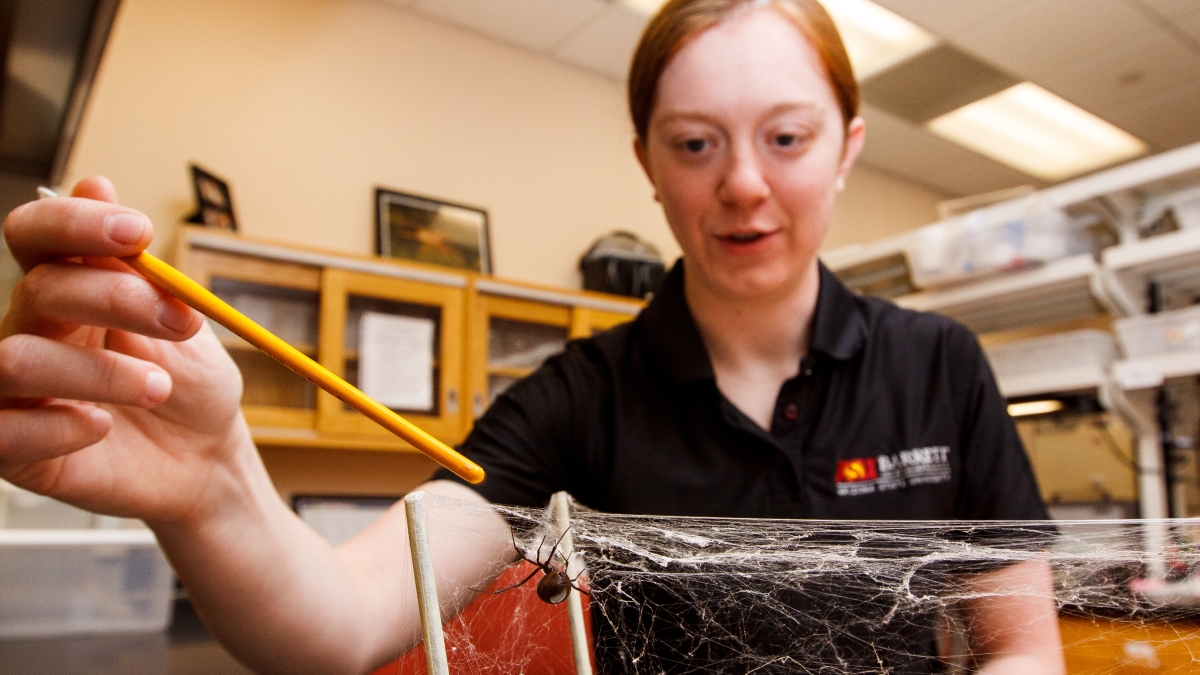Animal behavior research leads graduate to prestigious science meeting

The opportunity to share the results of her research into black widow spider behavior with scientists at the nation’s premier meeting for scientific researchers was “the icing on the cake” for Rebecca Halpin’s undergraduate career in ASU’s New College of Interdisciplinary Arts and Sciences and Barrett, The Honors College.
Halpin was selected to participate in a poster session at the annual meeting of the American Association for the Advancement of Science (AAAS), which took place in February in Boston.
“I presented my research to hundreds of scientists across so many disciplines that I can’t even begin to list them,” she said. “It was exhilarating and, oddly enough, the first time I felt fully confident in my ability to present this research I had conducted. Something about having several hundred scientists listen to me and validate what I had done really helped me realize that I know what I’m doing after all.
“I actually met one of the animal behaviorists I cited on my poster. He was particularly interested in my poster, and it was quite an honor to show him what I had done with the help of his previous work.”
A life sciences major with a minor in psychology in New College, the core college on ASU’s West campus, Halpin conducted her Barrett thesis project under the guidance of Chad Johnson. Johnson is an associate professor in New College’s School of Mathematical and Natural Sciences whose research focuses on animal behavior. The research relationship between Halpin and Johnson began through the New College Undergraduate Inquiry & Research Experiences (NCUIRE) program, which pays undergraduate students a stipend to conduct research in collaboration with faculty.
“NCUIRE allowed me the opportunity to really dive into my subject area – animal behavior – and get to know what it is that I’m passionate about in my research,” Halpin said. “Students who participate in NCUIRE work closely with research faculty, get deep into subject matter that they are interested in, and contribute their research to that particular field, all with the financial support to allow them to focus on this effort rather than working at an off-campus job that may not help them reach their career goals.”
Halpin’s Barrett thesis examined differences between desert and urban black widow populations in terms of “animal personalities.”
“In other words, do black widows act similarly across different situations, like when they are attacked, presented with food, or presented with a mate?” she explained. “Or are they able to modulate their behavior based on the specific situation they find themselves in, and is this behavior influenced by us and our very rapid urbanization of the Sonoran Desert where the black widows were residing before we came along?”
Results of the study indicate that black widows show a great deal of behavioral plasticity. “This means that they are able to modulate their behavior based on the situation they find themselves in and react in a way that is most beneficial,” Halpin said. “The ability to modulate their behavior in this way is most likely a crucial element to their ability to thrive in disturbed habitats like cities.”
“Rebecca’s research tenure with me is more reminiscent of a PhD student’s work than an undergraduate,” Johnson said. “Multiple ASU faculty members contacted me after Rebecca’s Barrett thesis defense to express their amazement at the quality of the presentation. One professor even joked, seriously I think, that he had seen tenure-track job interview presentations that paled in comparison to Rebecca’s defense.”
Halpin also designed and taught workshops for New College’s ExSciTE project, sponsored by a grant from Women & Philanthropy, a philanthropic program of the ASU Foundation for a New American University. ExSciTE brings middle school students to the West campus for interdisciplinary content workshops. During these workshops, students learn about one or more potential university majors through fun, hands-on activities.
“Rebecca is an amazing teacher,” said Susannah Sandrin, an assistant clinical professor in New College and director of ExSciTE. “She is able to distill a complicated topic to its most important pieces, so it is easy for students to understand. Rebecca also is skilled in leading students through the scientific process so they can make their own discoveries and conclusions. This is a skill that many professors work to develop their first few years of teaching, and it is so critical for engaging new scientists.”
Until fairly recently, Halpin was planning to attend medical school. But her New College and Barrett experiences put her on a new path.
“For almost seven years I was convinced that I wanted to be a surgeon,” she said. “I recently discovered, however, that I would much rather earn my PhD and teach, as well as conduct my own research, at a university.” After graduation Halpin will continue her research work in Johnson’s lab while she applies to doctoral programs.
Halpin hopes one day to have the same type of influence on students that her ASU professors have had on her.
“I've had some really amazing professors who have inspired me to be more than I currently am and to be a part of something bigger than me,” she said. “I have learned to work hard, play hard, be assertive, and have come to the understanding that there's no point in doing something if you aren't willing to do it right. They have really changed my view of what a professor is supposed to be. I can only hope that one day I can inspire students in the same way that they have inspired me.”